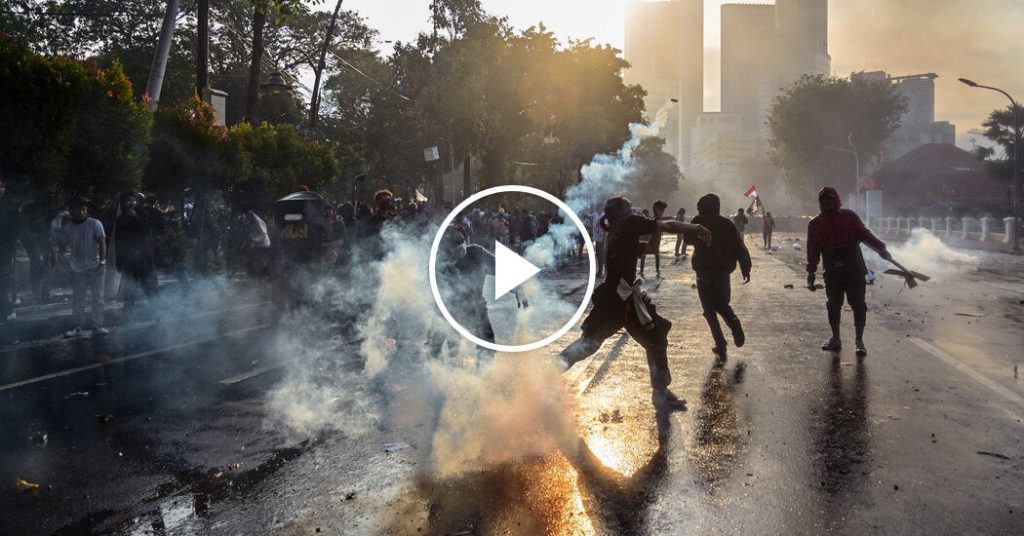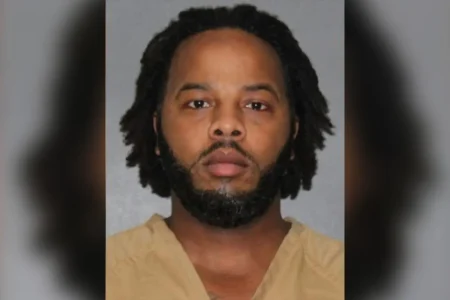Indonesia Erupts: Police Brutality Sparks Nationwide Protests After Taxi Driver’s Death
Demonstrations Escalate as Public Outrage Transforms Housing Allowance Protests into Anti-Police Movement
By Alex Reynolds | International Affairs Correspondent | August 30, 2025
From Economic Grievance to National Crisis: How Indonesia’s Protests Evolved
What began as targeted demonstrations against controversial housing allowances for Indonesian lawmakers has rapidly transformed into a nationwide movement against police brutality following the shocking death of a motorcycle taxi driver during protests in Jakarta. The incident, captured on video and widely shared across social media platforms, shows the driver being violently detained by police officers during what witnesses describe as a peaceful demonstration. The footage has ignited public outrage throughout Indonesia, with citizens from diverse backgrounds uniting in their demand for accountability and reform within the country’s police forces.
The initial protests, which started three weeks ago in response to a parliamentary decision to increase housing subsidies for legislators amid economic hardship for ordinary citizens, had been largely peaceful despite growing in size. Economic analysts note that the timing of the housing allowance increase struck a particularly sensitive nerve, as inflation has risen to 7.2% this year while real wages for most Indonesians have stagnated. “This was already a powder keg of economic frustration,” explains Dr. Siti Nurhayati, professor of political economy at the University of Indonesia. “Many Indonesians view the housing allowance as symbolic of a disconnected political elite prioritizing their own comfort while ordinary citizens struggle with rising costs for basic necessities.”
Violence Erupts: The Incident That Changed Everything
The situation dramatically escalated last Tuesday when Budi Santoso, a 34-year-old motorcycle taxi driver and father of two, participated in what was described as a peaceful march near the parliament building in central Jakarta. According to multiple eyewitness accounts, police began using tear gas and water cannons to disperse demonstrators who had gathered in numbers exceeding the officially permitted limits. During the ensuing chaos, Santoso was separated from his group and confronted by several officers. Smartphone footage shows him being tackled to the ground, struck repeatedly with batons, and restrained with excessive force. Santoso lost consciousness at the scene and was pronounced dead upon arrival at a nearby hospital.
“What we witnessed wasn’t crowd control—it was an abuse of power,” said Dewi Lestari, a human rights lawyer who was present at the demonstration. “Mr. Santoso posed no threat. He was simply exercising his constitutional right to protest.” The Jakarta Police Department initially claimed Santoso had been violent toward officers and suggested he had underlying health conditions that contributed to his death. However, an independent autopsy released yesterday contradicted these claims, determining the cause of death as asphyxiation resulting from chest compression during restraint—findings that have only intensified public anger and distrust toward authorities.
A Nation Responds: Unified Calls for Justice and Reform
The response to Santoso’s death has been swift and unprecedented in scale. Demonstrations have erupted in all major Indonesian cities, with particularly large gatherings in Jakarta, Surabaya, Bandung, and Makassar. What distinguishes these protests from previous movements is their remarkable diversity—uniting students, labor unions, religious groups, and middle-class professionals who might not typically participate in street demonstrations. An estimated 500,000 people gathered in Jakarta yesterday, creating a sea of protesters that stretched from the National Monument to the presidential palace.
The movement has coalesced around three primary demands: justice for Santoso and his family, including criminal charges against the officers involved; comprehensive police reform with civilian oversight mechanisms; and the resignation of the National Police Chief, General Hadi Purnomo, who has faced criticism for his defensive response to the incident. Social media has played a crucial role in organizing these demonstrations, with hashtags like #JusticeForBudi and #ReformPoliceNow trending consistently across platforms. Artistic expressions of solidarity have emerged throughout the country, including murals depicting Santoso and poignant protest songs that have gone viral online. “This movement transcends traditional political divisions,” notes social movement researcher Dr. Ahmad Fauzi. “We’re seeing unprecedented coalition-building between groups that haven’t historically collaborated, united by a shared demand for fundamental change in how police interact with citizens.”
Government Response: Between Conciliation and Control
President Widodo’s administration has struggled to formulate a coherent response to the rapidly evolving crisis. Initial statements emphasized support for law enforcement and warned against “disruptive protests,” but this approach quickly backfired as public outrage intensified. In a televised address yesterday, the President adopted a more conciliatory tone, promising a “thorough and transparent investigation” into Santoso’s death and announcing the immediate suspension of the officers directly involved in the incident. He also established an emergency commission to review police training and accountability procedures, though critics argue this falls short of the structural reforms protesters are demanding.
Meanwhile, parliament has hastily withdrawn the controversial housing allowance increase that sparked the initial demonstrations—a move widely perceived as too little, too late. Political analysts suggest the government faces a precarious balancing act between addressing legitimate grievances and maintaining authority. “The administration is caught between competing imperatives,” explains political scientist Dr. Riza Muharam. “They need to acknowledge the validity of protesters’ concerns while preventing further escalation that could threaten stability. Their challenge is compounded by the fact that trust in institutions has been severely damaged.” International human rights organizations have expressed concern about the situation, with Amnesty International calling for independent oversight of the investigation and urging security forces to respect citizens’ right to peaceful assembly.
Looking Forward: Implications for Indonesia’s Democratic Future
As protests enter their second week following Santoso’s death, the movement shows no signs of dissipating. In fact, labor unions have announced plans for a nationwide strike next Monday, potentially bringing additional economic pressure on the government. Constitutional law experts suggest this moment represents a critical juncture for Indonesia’s democratic development, testing the resilience of its institutions and the government’s responsiveness to public demands for accountability.
The crisis occurs against a backdrop of regional democratic backsliding, with several Southeast Asian nations experiencing democratic erosion in recent years. However, Indonesia’s robust civil society and free press offer reasons for cautious optimism. “What we’re witnessing is painful but potentially transformative,” says veteran democracy advocate Lina Sutanto. “These protests reveal deep institutional flaws, but they also demonstrate the vitality of Indonesia’s democratic culture and citizens’ commitment to holding power accountable.” As Budi Santoso’s funeral was held yesterday in his hometown of Bekasi, attended by thousands of mourners including many who never knew him personally, his death has become a powerful symbol in a struggle that extends far beyond one tragic incident. For a nation still working to consolidate its democratic transition, how this crisis resolves may well determine Indonesia’s political trajectory for years to come.
Alex Reynolds is the Southeast Asia correspondent for the International Times, covering political developments throughout the region. With over fifteen years of experience reporting from Indonesia, Malaysia, and the Philippines, Reynolds specializes in social movements, democratic governance, and human rights issues.











